Curriculum/Education
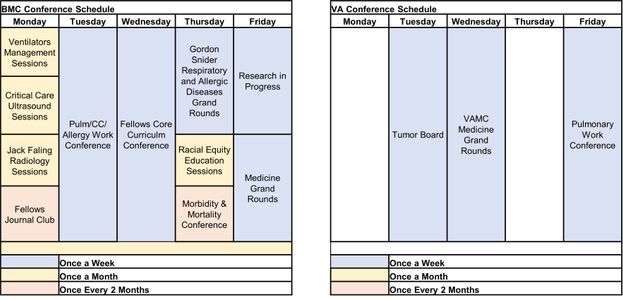
BMC Conference
Ventilators Management Sessions
Mondays, once a month, 12:00PM-1:00PM
Throughout the year, trainees will attend interactive simulation training sessions on ventilator management at BMC covering the following topics:
- Principles of mechanical ventilation
- Patient ventilator asynchrony
- PEEP and PEEP titration
- Esophageal manometry
- Diaphragm protective ventilation: Pmus, P0.1
- Respiratory time constant and status asthmaticus
- Closed-loop ventilation
Critical Care Ultrasound Sessions
Mondays, once a month, 12:00PM-1:00PM
During orientation trainees spend an entire day in the simulation center with faculty members trained in point of care ultrasound (POCUS) providing didactics and hands-on practice sessions with live models learning the key skills of vascular, cardiac and pulmonary ultrasound. In the fall, all first year trainees attend a 2-day ultrasound course taught by a multi-institution faculty core to reinforce POCUS didactics and skills. Throughout the academic year, all trainees attend didactic POCUS sessions at BMC covering the following topics:
- Introduction and Left Ventricular Function
- Cardiac Tamponade
- Right Ventricular Assessment in the Intensive Care Unit
- Advanced Lung Ultrasound
- POCUS in Cardiac Arrest
- Volume Responsiveness
- E-FAST
Fellows Journal Club
Mondays, twice a month, 12:00PM-1:00PM
For fellows, led by fellows. Fellows Journal Club is organized by senior fellows who select and circulate a relevant pulmonary or critical care article a week before the planned Friday discussion. Faculty with specific clinical or research experience related to the selected article are invited to attend to provide their own perspectives. Discussions are guided by clinical cases that provide context.
Pulm/CC/Allergy Work Conference
Tuesdays every week, 12:00PM-1:00PM
This is a weekly conference attended by the fellows and faculty of the pulmonary and cardiothoracic surgical services to discuss the diagnostic and therapeutic management of complex patients at BMC. This conference provides an opportunity to discuss patient care in a multidisciplinary format and gives fellows training in interpreting complex radiology and developing differential diagnoses. Each conference session starts with a 15-min teaching session led by second and third fellows on a particular topic in pulmonary and critical care medicine (recent topics selected by fellows: outpatient clinical trials; family meetings in the intensive care unit; ventilator physiology; interpreting CXRs).
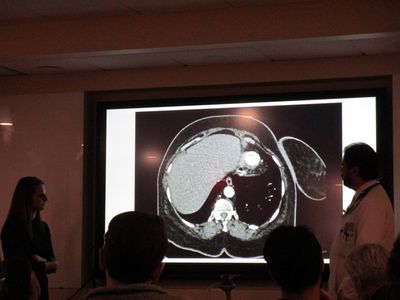 |
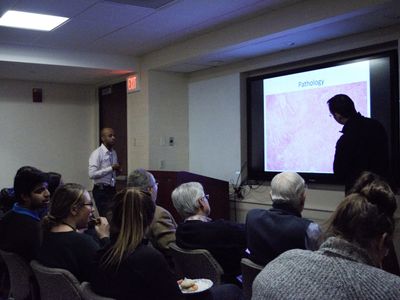 |
Fellows Core Curriculum Conference
Wednesdays every week, 12:00PM-1:00PM
There is a weekly didactic teaching session for trainees that are designed to cover core topics in pulmonary and critical care medicine. The goal of the core curriculum is to provide a foundation in the basics of pulmonary and critical care medicine. Additionally, we have an outpatient pulmonary curriculum utilizing case-based teaching scripts available for all fellows.
Gordon Snider Respiratory and Allergic Diseases Grand Rounds
Thursdays every week, 12:00PM-1:00PM
The entire pulmonary division along with several community-based practicing pulmonologists attend the weekly Gordon Snider Respiratory and Allergic Diseases Grand Rounds. At this interactive clinicopathologic conference, first year trainees present “unknown” clinical cases to faculty members. Fellows are able to observe and learn how a faculty member reasons through a case as data is presented. Key elements of the case are discussed by the faculty member and at the end of the discussion, the first year trainee presents a summary of the pertinent relevant literature. The intent is to highlight new and classical literature regarding diagnosis, treatment, or disease mechanisms. During this conference, pulmonary faculty also give clinical updates as well as research presentations by trainees within the Pulmonary Center.
Racial Equity Education Sessions
Wednesdays, once a month, 3:30PM-4:30PM
Morbidity & Mortality Conference
Thursdays, once every 2 months, 12:00PM-1:00PM
Monthly case-based conference led by senior fellows with the goal of identifying system-based solutions to near-misses or cases resulting in harm. Fellows receive guidance from expert faculty in preparing and presenting cases. Presentations are expected to be non-judgmental, often bring in experts from across the campus and focused on practice-based improvements.
Research in Progress
Fridays every week, 9:00AM-10:00AM
Research in Progress brings together basic, translational, and clinical faculty and trainee researchers from across The Pulmonary Center and affiliated departments and sections in an open forum to discuss on-going research projects. The goal of this conference is for researchers (faculty and trainees alike) to gain valuable feedback on their existing projects and to form new multi-disciplinary collaborations and ideas with others across campus. Throughout the year, this conference also holds several named lectureships that bring in world-renown experts to discuss their research and network with our trainees.
VA Conference
Tumor Board
Tuesdays every week, 7:00AM-8:00AM
This is a multidisciplinary conference in which thoracic surgery, oncology, radiology, pulmonary, and radiation oncology review lung cancer patients and formulate diagnostic and management plans. During this conference session, fellows have the opportunity to hear the clinical presentations of thoracic patients, review the chest imaging by CT and PET, review the pathology of biopsies and resections performed. The fellows learn about immunohistochemistry and the genetic mutations seen in lung cancer. The fellows learn how to perform clinical and pathologic staging of lung cancer patients and the state of the art management of lung cancer patients that includes surgery, neo-adjuvant chemotherapy/radiotherapy, adjuvant therapy, stereotactic radiosurgery, and immunotherapy.
Pulmonary Work Conference
Fridays every week, 12:00PM-1:00PM
This is a weekly conference attended by the fellows and faculty of the pulmonary services to discuss the diagnostic and therapeutic management of complex patients at VA. This conference provides an opportunity to discuss patient care and gives fellows training in interpreting complex radiology and developing differential diagnoses.
Simulation Training Programs
The state-of-the-art Solomont Simulation Center at BMC is utilized by the Pulmonary and Critical Care Medicine Fellowship for skill development. The list of simulation programs include bronchoscopy, mechanical ventilation, pleural disease, airway management, and critical care ultrasound.
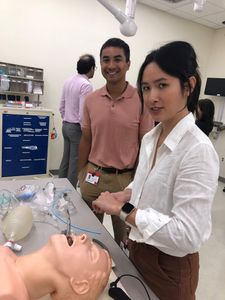 |
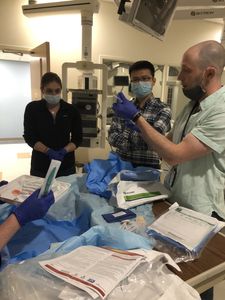 |
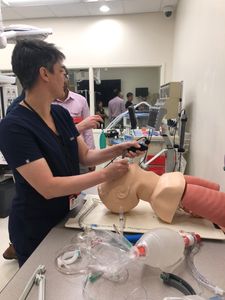 |
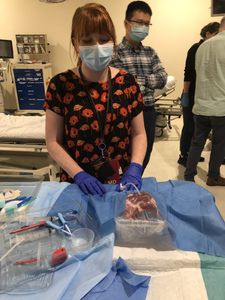 |